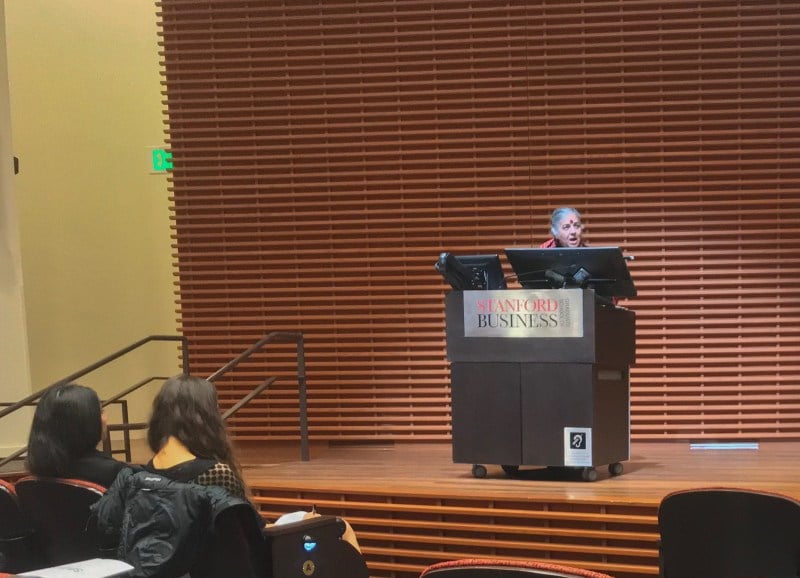Environmental activist Vandana Shiva delivered her talk “Soil not Oil: Biodiversity-Based Agriculture to Address the Climate Crisis” on Thursday at CEMEX auditorium. The lecture, presented by Students for a Sustainable Stanford (SSS), was the eighth annual Stephen H. Schneider Memorial Lecture. Schneider was a renowned climate scientist and senior fellow at the Stanford Woods Institute for the Environment.
In her talk, Shiva attacked industrial farming as immoral and fraudulent, claiming that “the poisoned cartel wants to destroy small farms because of the illusion that industrial agriculture is more effective.”
She attributed the world hunger crisis to industrial farming, and called food the “currency of life.” Her tendency toward metaphor and spiritual rhetoric at times approached the theatrical, such as when she proclaimed, “In this handful of soil is your future — take care of it and it will take care of you, destroy it and it will destroy you.”
Shiva, who is outspoken against the globalization of agriculture, has argued that “the prevailing model of industrial agriculture, heavily reliant on chemical fertilizers, pesticides, fossil fuels and a seemingly limitless supply of cheap water, places an unacceptable burden on the Earth’s resources.”
The event — in which SSS organizers did not allow direct questions from the audience but read some questions from written submissions — saw little acknowledgment of outside controversy.
The event took place despite a December open letter by dozens of scientists and bioengineers who blasted Stanford administrators for inviting Shiva. The letter decries Shiva’s “use of anti-scientific rhetoric to support unethical positions.” Shiva is a polarizing figure for her opposition to genetically engineered golden rice and anti-globalist positions. She has drawn heavy criticism from scientists for provocative statements like a tweet comparing GMOs to rape.
The letter cited her comments in a 2011 speech. “Fertilizer should never have been allowed in agriculture,” The New Yorker quoted her as saying. “I think it’s time to ban it. It’s a weapon of mass destruction. Its use is like war, because it came from war.”
The open letter also called into question the sustainability of Shiva’s proposed methods.
“Her views are demonstrably, unequivocally anti-sustainable,” the scientists wrote. “Her ideas on farming would relegate it to a primitive, low-yielding, wasteful activity.”
SSS provided a statement to The Daily on behalf of the group, addressing the choice of speaker.
“We are committed to engaging difficult conversations at the intersection of sustainability and social justice,” SSS wrote. “In order for these conversations to be effective and inclusive, we believe all stakeholders deserve a seat at the table. Even if some of those stakeholders are controversial.”
SSS also discussed the value of engaging with differing opinions.
“The goal of this lecture is not to endorse a single individual, ideology or solution,” SSS wrote. “On the contrary, we aim to provoke critical thought — to spur nuanced conversations that help students examine their own values.”
Chris Field, the Melvin and Joan Lane Professor for Interdisciplinary Environmental Studies, expressed supported of SSS’s decision to invite Shiva this year.
The choice of speaker “has provided a valuable opportunity for students to see firsthand how contentious some of these issues can be,” Field wrote in an email to The Daily. “In my subsequent conversations with the student organizers, it’s been clear they are thoughtfully examining the feedback they’re seeing. They realize one doesn’t need to agree with every comment a person ever made in order to find value from their perspective.”
Field, who is also a director of the Woods Institute — which co-sponsored the event — was the addressee of the critical open letter from scientists.
“Students for Sustainable Stanford organizes, selects speakers and does the lion’s share of the work to present and promote the lecture,” Field wrote, “while the institute helps out with securing and paying for venue rentals on campus along with associated event production costs like videography and A/V.”
The open letter also asked how much Stanford was paying for Shiva’s appearance.
SSS wrote that payments to Shiva totaled $8,500 and were limited to “travel from Delhi, India, as well as lodging expenses with an honoraria for her charitable organization,” saying that the amount was “consistent with cost associated with bringing past speakers to campus.”
Madison Connell contributed reporting.
Contact Ujwal Srivastava at ujwal ‘at’ stanford.edu.
